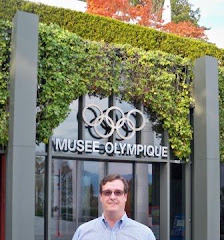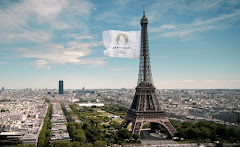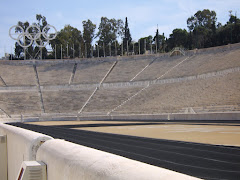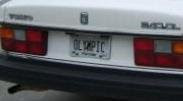When PBS premiered the three-part documentary "Hemingway" from Ken Burns and Lynn Novick in April, the network also teased "Muhammad Ali" set to debut Sept. 19.
The trailer brought to mind another network's slogan: "Must See TV."
Reminders also arrived printed on monthly statements from Bank of America, the lead corporate funder of the boxing legend project reportedly in the works for more than five years. Here's a trailer for those who haven't seen it:
Pretty much anything Ali -- among the most admired Olympians and individuals of all time by this blogger and billions of others -- captivates my attention, and I marked my calendar to request media access to a preview screener.
The series was worth the wait and well worth the eight hours of advance viewing time this past week, and I encourage anyone interested in history, sports, race relations, faith and understanding, inspirational narratives, the Olympics and professional boxing and/or Ali to make time for the broadcast or streaming of "Muhammad Ali."
As with other documentary deep dives for which Burns is known, this film co-directed with his daughter Sarah Burns and her husband David McMahon takes viewers on a thoroughly detailed journey of the legendary boxer's life. It's organized into four two-hour episodes titled:
- "Round One: The Greatest" (1942 to 1964) on the boxer's upbringing and initial ascent to stardom
- "Round Two: What's My Name?" (1964 to 1970) framing the fighter's professional feats and struggles to defend his beliefs including his faith-based name change
- "Round Three: The Rivalry" (1970 to 1974) showcasing legendary bouts with Joe Frazier, and
- "Round Four: The Spell Remains" (1974 to 2016) detailing the peaks, valleys, challenges and opportunities experienced by the champ in his later years.
Many narratives about Ali rely on his Olympic successes of 1960 and 1996 as "bookends" and the new documentary also employs this format. Therefore, it was not surprising that most of the boxer's Rome 1960 feats were already packaged and revealed only 35 minutes into Episode One.
The film delivers surprises including new-to-my-eyes images from the 1960 Olympic trials at San Francisco's Cow Palace, footage of ABC's Jim McKay in his first Olympic broadcast gig (foreshadowing The Champ's later "Wide World of Sports" clips), and celebrities or fellow Olympians with whom Ali connected as he became the unofficial Olympic Village "mayor."Also pleasing through all four episodes was an original score by Jahlil Beats and soundtrack selections from Beyonce, Marvin Gaye, James Brown, Ray Charles and The Rolling Stones, among others. Narration by Keith David -- whose voice some may recognize for the question "Is it the frank or the beans?" in "There's Something About Mary" -- also caught my attention.
In addition to Games-related moments or players, I was looking for more details about Atlanta's role in Ali's return to fighting after his ban for conscientious objection (a timeline detail first learned through the city's Civil Rights Tour a few years ago).
The film delivered the city's first major cameo about an hour and 40 minutes into Episode Two, with grainy Channel 2 footage of interviews with local yokels, Ali's weigh-in and fight with Jerry Quarry at Atlanta Municipal Auditorium, and Coretta Scott King's post-bout presentation of a Dr. Martin Luther King Memorial Award (spoiler alert: she appears again in footage from July 19, 1996).In a five-ringed sense, "Muhammad Ali" ultimately includes Olympians Ali, his final Rome opponent (1956 and 1964 Olympic bronze medalist Zbigniew Pietrzykowki of Poland), Wilma Rudolph, Rafer Johnson, boxers Frazier (1964 Tokyo), George Foreman (Mexico City 1968) and Leon Spinks (Montreal 1976). Nods are also given for Dr. Tommie Smith and John Carlos as well as Michael Johnson.
Later, in the footage of Ali lighting the Olympic Cauldron in Atlanta, Evander Holyfield (Los Angeles 1984) and Olympic swimming champion Janet Evans also appear without commentary, as did brief reference to Jesse Owens. Off-camera contributions also are credited to Bob Costas, Dick Ebersol, the USOPC and IOC. International Society of Olympic Historians (ISOH) was not engaged, according to Burns' spokesperson. A full list of historian and other expert contributors appears in the "Muhammad Ali" press release and IMDB page.By the time the teenage Cassius Clay enjoyed a congratulatory Olympic champion parade through downtown Louisville, he already had 100 other boxing wins under his belt. This stat sets up an easy segue for Burns & Co. to next unfurl about seven hours of non-Olympic history before the Games' return in Episode Four.
This documentary taught me a lot about Ali while reminding me of -- or filling in a few blanks during -- the arcs of his career that earned the respect and adulation of millions (and later billions) juxtaposed with loathing condemnation of others. I knew of Ali's biggest fights and had seen footage from some of them but did not know the detailed back-stories for each bout, and some of them are fascinating.In an email exchange with the publicist for Mr. Burns, I asked about what, if any, biggest surprises about Ali's Olympic endeavors were revelations for the filmmakers.
"The[re] weren't revelations but just appreciating how young [Ali] was in 1960 was extraordinary," wrote the spokesperson. "And of course the grace with which he handled the Olympics in 1996."
Indeed the scenes of Ali on July 19 a quarter-century ago are moving. In an informative promotional webinar conversation for the film held on that anniversary two months ago, Burns spoke about the film while Evans, the penultimate 1996 Olympic torchbearer, shared insights from the experience of meeting Ali in front of 3 billion people.
"If this is a film about freedom, it is also a film about courage," said Burns. "From the start we wanted to humanize him."Though Evans was not interviewed for "Muhammad Ali" she shared perspective on the "Conversations" episode.
"When he was holding the torch it was for everyone," Evans said. "He was saying show up, be present, find your voice, tell your story, make a difference."
For all its greatness, Burns' documentary painted some broad strokes that left me wanting more detail. For instance, there's way more to the story of Ali's super-secret final torchbearer designation, and more time and interviews -- with Evans or Ambassador Andrew Young, who loves telling his story of time spent with Ali on July 19, 1996 -- could have easily filled in viewers with more perspective on that glorious reveal on the big night.
I also found it hokey that only seconds into his stadium entrance footage, the soundtrack for "Muhammad Ali" swells with an ill-timed cue for "I'll Take The Long Road" by Naomi Shelton & The Gospel Queens (love this song, mind you, but viewers could do without the guitar distracting from the drama of the real life moment that launched billions of gasps).
Also, how could a filmmaking team that did such a deep dive on Country music resist mentioning how Ali's semi-autobiographical 1977 feature film "The Greatest" later inspired Whitney Houston to record one of her biggest hits "The Greatest Love of All" despite objections from producer Clive Davis? Was this an oversight (I doubt it)? A recording rights or royalties issue (maybe)?
I was also hopeful the film would include Ali's later Olympic moments, like lighting the first torch of the 2002 Winter Olympic torch relay at Centennial Olympic Park in Atlanta.Mitt Romney was there and could have spoken with Burns about Ali's selection for this honor, which built on a tradition established with Rafer Johnson in 1984/1996. Mention of Ali's final Olympic appearance at the London Olympic Opening Ceremony in 2012 also made my wish list but did not survive editing (if ever it was considered).
Burns & Co. seemed more interested in rushing to other conclusions, even cutting short footage from the star-studded memorial service with speeches by President Bill Clinton, Bryant Gumble, Billy Crystal and several faith leaders watched by 1 billion worldwide. Will I be the only Sept. 2021 "Muhammad Ali" viewer who thought Burns' team could or should have included more than one minute of funeral procession footage? Only time will tell.
Zero inclusion of the IOC's presentation of a replacement Olympic medal in Atlanta was a head-scratcher, too. Was this "boring" to the production and writing team? Or filmmaker indifference?But almost everyone has an Ali story or moment to share, and to their credit the Florentine Films team covers all the right bases without getting distracted by some populist options.
This preview/review thus results with a split decision in favor of and highly recommending "Muhammad Ali" by Burns, Burns and McMahon -- definitely must-see TV even for those who may still hunger for more of The Greatest.
Promo image via PBS; Ali image in Rome via uncredited Pinterest post; Ali with Howard Bingham and Janet Evans by "PA" via Irish News; Ali fighting Quarry in Atlanta via Joe Holloway, Jr. of AP and this WABE link; Coretta Scott King with Ali via The King Center's Twitter feed; Ali with Mitt Romney via Chris Stanford/Getty Images in Harvard Law Bulletin; Neil Liefer/Getty Images via About Photography Blog. Photos of Ken Burns by Evan Barlow, Sarah Burns by Michael Lionstar and David McMahon by Sarah Burns courtesy of PBS Pressroom.



















